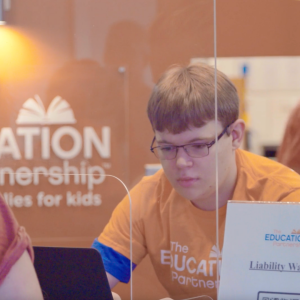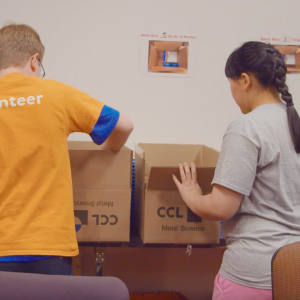
Introduction
As the school year approaches, it’s important to ensure that youth with disabilities are set up for success and seen for their ability and not their disability. With the proper preparation and resources, the transition can be smoother. Here are some practical tips to help you prepare for the new school year, with insights from The Education Partnership, a nonprofit organization committed to providing teachers from under-resourced schools across southwestern PA with the supplies to support students with adequate tools to thrive in the classroom.
Establish a Routine Early
Starting the school routine before classes begin is key. Parents can help by gradually adjusting sleep routines to easily transition into the school year. This consistency helps youth adapt more easily to the structured environment of the school day. Practicing daily tasks, like packing a backpack, organizing supplies, eating breakfast can also make the morning routine feel familiar and less stressful. Schedules, structures, and routines can improve a sense of well-being, and a child’s ability to regulate their behavior and help with independence and confidence in life skills.
Engaging with the School Community
Communication with the school is essential to ensure that a child’s needs are met from the start. Parents should proactively reach out to teachers, counselors, and special education staff to discuss necessary accommodations or supports. In the student’s perspective, they can benefit from meeting their teachers beforehand, which can make the classroom environment feel more welcoming and reduce first-day jitters.
Local Online Communities
Additionally, Parents of youth with disabilities can benefit greatly from joining relevant Facebook groups, which serve as valuable online communities for support, advice, and resources. These groups often bring together parents, caregivers, and professionals who share experiences, challenges, and successes related to raising children with disabilities. By joining these groups, parents can connect with others who understand their journey, access information on local and national resources, and stay informed about the latest developments in disability rights and advocacy. Parents or students can start by searching for keywords related to general terms such as “youth with disabilities”, “Pittsburgh support group” or “youth & transition”. Many groups are private to ensure a safe and supportive environment, so you may need to request to join! Moreover, with a simple search we found groups like “Special Needs Support Group of Southwestern PA” and “Pennsylvania People with Disabilities” (which is a public group).
School Supplies
For Parents:
Having the right tools at hand can make a significant difference in a student’s school experience. Parents can help their children organize supplies in a way that promotes independence and readiness.
Here are 5 must have back-to-school supplies
- Glasses: Glasses are the up most important supplies to have, especially for those with down syndrome as eye disease is reported in 60-80 % of individuals, according to National Down Syndrome Society.
Picture - Pencil Grip: Pencil grips are widely used in classrooms, home, and in therapeutic settings. Not only does it offer as a training tool but also as a fidget for when the individuals needs to re-focus or reduce stress.
- Chair Bands: This fun and durable band lets the student wrap around a standard classroom chair and fidget with their feet without interrupting fellow classmates.
- Visual Timer: A visual timer can help students with ADHD or other executive functioning challenges manage their time better. These timers provide a visual representation of time passing, which can be easier for some students to understand compared to traditional clocks.
- Visual Schedules and Communication Boards: These tools are beneficial for students with autism or other communication difficulties. Visual schedules help students understand and anticipate daily activities, while communication boards can assist those who are nonverbal or have limited speech abilities in expressing their needs and thoughts more effectively.
Key Tips for Organizing Supplies:
- Use color-coded folders or binders for each subject.
- Label all supplies to ensure they are easily accessible.
- Keep essential items in a designated space to reduce last-minute searches.
Practice Social Skills
Social interactions are a vital part of the school experience, and practicing these skills can help reduce anxiety. Parents can role-play common social situations, such as introducing oneself or asking for help, to build their child’s confidence. Students are encouraged to practice small interactions, like greeting classmates or asking to join in activities, which can help them feel more comfortable in social settings.
Stay Positive and Flexible
Tip for teachers:
For the past two years, we had the privilege to partner with The Education Partnership during the summer with our Youth & Transition Program. Through their dedicated efforts, The Education Partnership provides essential school supplies to students and teachers in under-resourced schools across Southwestern PA, helping to bridge the gap between what educators need and what they must succeed. It was also through the collaboration of our team and partnership, that we were able to see the student that participated in the program during both summer programs grow, transform and become more confident young individuals. For more information on their Teacher Resource Center and other programs please visit their website here!
Click the video below to learn more about how The Education Partnership is making a difference in our community in collaboration with us!
The Education Partnership’s initiatives provide essential supplies to teachers that are in under-resourced schools. This non-profit organization ensures families, students, and teachers are equipped and ready to learn and build the confidence and success in school.



Tip for Parents:
Celebrate small victories and stay flexible with your expectations. Every child’s journey is unique, and progress may come in different forms. Maybe develop a reward system that aligns with their goals and interests to help streamline success.
Tip for Youth:
Focus on what excites you about the upcoming school year, whether it’s learning something new or making new friends. Do your best to stay positive and remain open to new experiences.
“My advice to other disabled people would be, concentrate on things your disability doesn’t prevent you doing well, and don’t regret the things it interferes with. Don’t be disabled in spirit as well as physically.” —Steven Hawking
Conclusion
Preparing for the school year involves more than just gathering supplies. By establishing routines, fostering communication, organizing materials, and practicing social skills, parents and students can create a smoother transition into the new academic year. With the support of organizations like Life’sWork of Western PA and The Education Partnership, teachers and students can access the resources they need to succeed.
LEARN MORE
If you found these tips helpful and would like to learn more about our Youth & Transition Program reach out to
Ami Steinmetz, Director of Youth & Transition Services

